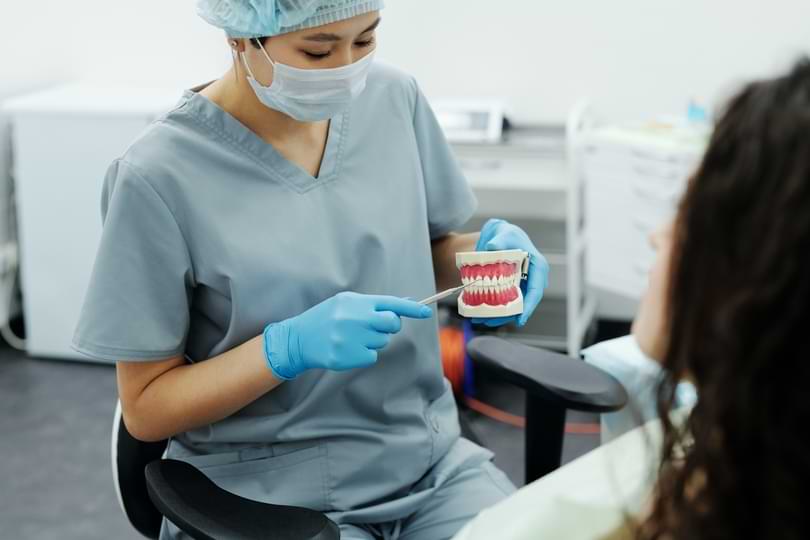
A smile is a key defining feature of any person’s face, so naturally you’re going to want it to look the best it can. Dentures are a great solution for patients who have lost some or all of their teeth either as result of decay, disease or an accident. Now depending on certain factors, patients can choose to get either full or partial dentures. Understanding the difference between the two can help you decide what’s best for you.
What Are Partial & Full Dentures?
Dentures are designed to be comfortable for the user and help them chew and talk just as well as they could with natural teeth. Depending on the user’s needs, they can get either partial or full dentures.
Full Dentures
Full dentures are made up of teeth attached to a flesh-toned base, which is moulded to fit snugly on both the upper and lower gums of the person’s mouth. Full dentures contain a whole set of teeth and are manufactured to recreate the feeling and appearance of natural teeth.
Partial Dentures
A partial denture is made up of a plate with one or more prosthetic teeth attached to it. This plate is then fitted into the gaps where the person is missing teeth. Partial dentures are for when you need replacement teeth for just a specific portion of your mouth. Usually, if your teeth are in good condition, a dental bridge will work just fine. However, partial dentures are a good choice for patients who do not have strong natural surrounding teeth.
When Might You Need Partial or Full Dentures?
Now that we have established the major difference between the two, it’s time to decide when you may need full or partial dentures. The key deciding factor depends upon the number of teeth the individual is missing. If you still have some or most of your teeth remaining in your mouth, you may just need partial dentures to fill in the necessary gaps. However, if you have no teeth left, are missing most of them or are suffering from chronic dental issues, you may want to get full dentures. Keep in mind that your prosthetist may recommend first getting the remaining few teeth extracted before proceeding with full dentures.
Advantages of Dentures, Full or Partial
Those who have never used dentures before can be quite skeptical about whether they work or not. Well, you would be surprised to know that there are several advantages to using either partial and full dentures.
Top Benefits of Partial Dentures
Partial dentures normally prioritise saving any remaining natural teeth. Whether you have partial dentures for front or back teeth, upper or lower, these partial dentures will help maintain the condition of your existing teeth by preventing them from shifting and growing weak over time. For instance, with your partial dentures in place, you won’t overuse a single side of your mouth as you may if teeth are missing. This then protects the remaining teeth against wear and tear.
Partial dentures are also less invasive compared to full dentures since you do not need to get a whole mould of your mouth taken for the process. Additionally, they can be convenient, as over time, you may even be able to add extra teeth to the dentures if the need may arise.
Partial dentures are also usually less costly compared to full dentures, as less denture needs to be made as well as less of your mouth needs to be assessed. Additionally, you may even be able to get same day services since it is generally a quicker process than full dentures. This way, you save more time and avoid a lengthy wait for your next appointment.
Key Benefits of Full Dentures
While they might be more time consuming at the start, full dentures are a great solution for those who suffer from chronic oral diseases. They intend to provide maximum functionality, while limiting oral-related pain.
Since full dentures are meant to replace all the teeth in your mouth, you will be getting a much more uniform and natural look. Though partial dentures can be made to look almost exactly the same as your teeth, the process to do so may be a bit more costly as your prosthetist may need to spend some time creating replicas of your existing teeth.
Another great thing about getting full dentures is that it helps fill out your face, giving a healthier appearance and restoring your bright smile.
So, are full dentures better than partials? It depends on your needs! Your oral prosthetist will help you find the best fit for you.
How Much Would Dentures Cost?
In today’s market, you can expect a pair of dentures to cost anywhere between $2000–$4000. On average though, full dentures cost, in Australia, roughly around $1100–$2000. However, you can expect partial dentures to cost a bit less, averaging around $700–$1700.
Keep in mind, however, that the final price will be dependent on several factors including the number of teeth missing, the material used to make the dentures, the type of dentures, the techniques needed and the complexity of your individual case. Of course, when you’re dealing with something as important as your oral health and even ability to speak, eat and smile, you don’t want to be penny pinching on quality.
How to Choose What’s Best For Me?
When it comes to actually getting a new pair of dentures, the most important thing to know is what your specific situation demands. Sometimes you may not even need to get dentures and another false teeth option, like implants, may be the best solution.
To know what option is best for you, it is best to have a chat with your dental prosthetist to discuss what the best course of action is. At Direct Denture Care, we offer the best services for partial and full dentures in Perth. If you would like to discuss your options, contact us on (08) 9440 1540 for a free consultation today.











